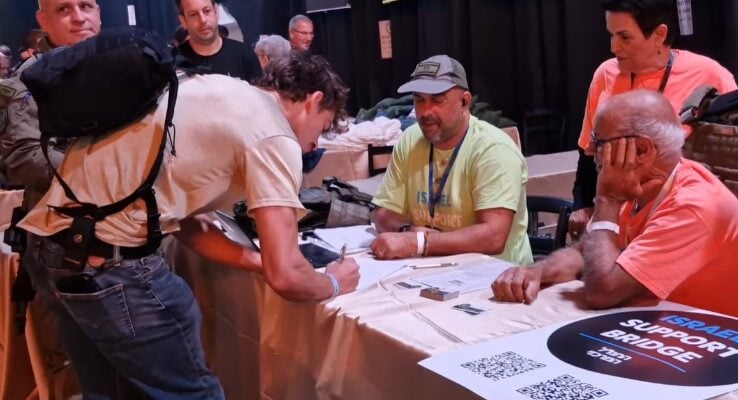Friday’s event was complete with stands and booths giving away everything from tactical gear and vests to gifts, clothes, and school for the children of squad members, also came complete with food, live music, and speeches.
By Noah Michaeli, TPS
Understaffed, undersupplied, underfunded, and overworked, local Israeli civilian security teams were forced to battle heavily armed Hamas terrorists on October 7.
Since then, they have been forced to do everything from providing security for their communities during an ongoing war to putting out forest fires sparked by daily Hezbollah missile barrages.
In the face of these challenges, two Israeli nonprofits, Civil Squads of Israel and Israel Support Bridge, came together with around 1,500 members of the security teams and their families for an event on Friday morning, to provide some badly needed equipment, and express appreciation.
“For some, it’s one of the only times they’re able to get together and have a good time with their family in safety since October 7,” Alon Tirer, one of the founders of Civil Squads of Israel, told The Press Service of Israel.
Before the October 7 attacks, members of kitot konenut — as they are known in Hebrew – were trained in basic military and first aid skills and equipped, in theory, to handle threats until security forces arrived.
However, many civil defense squad members didn’t have enough helmets, vests, weapons, and more.
Friday’s event was complete with stands and booths giving away everything from tactical gear and vests to gifts, clothes, and school for the children of squad members, also came complete with food, live music, and speeches.
“The [Israel Defense Forces] are here to protect us, but we must recognize that in the critical first minutes, the local defense force will often stand alone,” said former Prime Minister Naftali Bennett at the event.
“If four individuals managed to fend off dozens of terrorists, imagine what a platoon with machine guns, reserve training days, and a properly funded security coordinator could achieve – nothing could overcome them,” he added.
For that reason, one of the main focuses of the event was enabling civil defense squad members to stock up on gear, Tirer explained.
“People can choose for themselves whatever equipment they like. It’s shopping for free,” he told TPS-IL.
The two nonprofits have done significantly more than that over the past year.
While Civil Squads of Israel is on the ground providing gear and training to the individual kitot konenut, Israel Support Bridge is known for its connections with donors, recipients and various government bodies.
“After October 7, I reached out to all the people I knew,” Ben Mammon, founder and CEO of Israel Support Bridge, told TPS-IL.
Mammon quickly began talking to people on the ground, different organizations, and government ministries, organizing a database of Israel’s wartime needs and figuring out how to get it to the right people.
One of those people was Nir Alon, founder and CEO of Civil Squads of Israel.
Born and raised in Kibbutz Sufa in the Gaza border region, Alon survived October 7 in a shelter at the kibbutz, and attributes his survival to the sacrifice of his community’s security team.
“During the attack there were only four people in the civil squad in Sufa, only four rifles with no scopes,” Alon recalled.
“Without the civil squads I wouldn’t be here, so I took this very seriously and realized that something needs to be done,” Alon said.
Since then, Civil Squads of Israel has launched trainings and supply drives across the country, training and equipping Israel’s frontline civilian responders in firefighting, first aid, and self-defense.
But needing help, Alon turned to Israel Support Bridge and its supply chain.
“Before long I had a full 747 plane land in Israel under my name, and after that two planes every week,” Mammon explained.
The partnership “enables buying in bulk: medical equipment, vests, firefighting support, whatever people need. The mechanism was always the same, working together, accumulating the resources, and getting the project done. Ultimately, we’re two big nonprofits working together towards the same goal,” Tirer said.
“Its’ one of those cases where one plus one is ten.”





